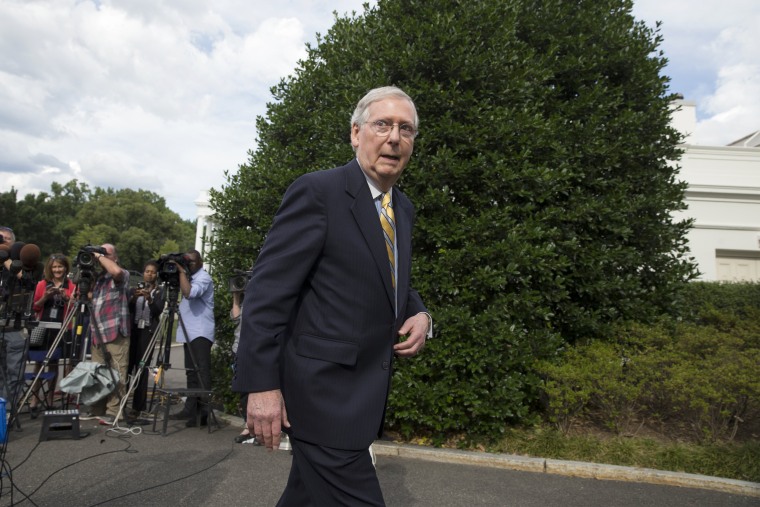WASHINGTON — As negotiations continue on a new version of the Senate Republican health care bill, there is growing movement towards preserving some taxes on wealthy Americans, a decision that could anger some conservatives but appease moderates in the search for a compromise.
The move could reduce the proposed cuts in Medicaid spending and provide for additional spending on opioid treatment, two issues currently under discussion among Republican senators.
It could also help the Republicans politically by making it harder for Democrats to argue that the GOP plan is little more than a tax break for the wealthy and a health-care cut for those most in need. The first draft of the GOP plan proposed cutting more than $770 billion to Medicaid and almost an equal amount in taxes.
As they leave Washington to head home for the next ten days, senators have yet to come to a new agreement on a bill to restructure the Obama-era Affordable Care Act. Critical senators met with Vice President Mike Pence Thursday in the Capitol.
Led by Republican Leader Mitch McConnell, senators continue to work on major issues to fit together the complicated puzzle of getting moderates and conservatives to agree. They are working toward sending a new bill to the Congressional Budget Office in the next day for an analysis when they return the week of July 10th.
On Friday, President Donald Trump tweeted, "If Republican Senators are unable to pass what they are working on now, they should immediately REPEAL, and then REPLACE at a later date!"
Perhaps furthering the argument of proponents who favor of extending the tax on the wealthy is a new analysis by the Congressional Budget Office report that says Medicaid would be reduced by 35 percent in the second ten years — 2027 to 2036 — of the GOP bill, compared to 26 percent in the first ten years.
The taxes imposed on wealthier Americans in President Barack Obama's Affordable Care Act include a 3.8 percent tax on investment income for people making more than $200,000, a tax that brings in $172 billion over ten years, one of the biggest revenues sources in Obamacare.
Sen. John Hoeven, R-N.D., said Wednesday that keeping the tax is part of the discussion. Will it be adopted? “We’ll see,” Hoeven said.
“If we decided that we were not to repeal that Obama-era tax, we would know that we would have $172 billion available that we could reapply back into ... some of the issues that have been of concern to some people around the country,” said Sen. Mike Rounds, R-S.D., on MSNBC’s “MTP Daily.” “So I think that's on the table.”
Keeping a tax on the wealthy was vigorously debated among Republicans in the House of Representatives when they worked on their health care bill. But conservatives, who wanted a repeal of all of the Obamacare taxes, won that argument and the tax cuts for the wealthy remained in the bill they eventually passed.
Sen. Lindsey Graham, R-S.C., said that keeping some of the taxes keeps Republicans further from their campaign promise of repealing Obamacare.
"The more you do this, the more it’s like Obamacare, so eventually you’re going to cross a line where saying you repeal and replace Obamacare, it’ll be hard to say with a straight face if you keep doing this stuff," Graham told reporters.
Democrats have spent the last week arguing that the tax cuts are paid for by cutting Medicaid, a message that has helped sour public opinion on the GOP efforts. Just 16 percent of Americans said they support the health care bill int the latest NBC News/Wall Street Journal poll.
Related: Are Democrats Really Ready to Negotiate on Health Care?
“The details have changed a bit around the edges, but the core has remained the same in each and every version: slash Medicaid to the bone in order to give a massive tax break to a very small number of wealthy Americans,” Senate Democratic Leader Chuck Schumer said on the Senate floor Wednesday. “Cut support for Americans in nursing homes, those suffering from opioid addiction, and those with a pre-existing condition to pay for a tax break for the wealthiest few.”
Negotiators are considering adding $45 billion on funding for opioid addiction, a demand by Sens. Shelley Moore Capito, R-W.Va., and Rob Portman, R-Ohio, who hail from states with a deepening crisis.
Other Republicans, mostly from Medicaid expansion states, are also worried about the dramatic cuts to Medicaid for low-income and disabled Americans beginning in 2021 and getting deeper in 2025.
Sen. Bob Corker, R-Tenn., is also pushing to keep the tax on high income earners.
“As you look at the exchange and you look at where lower income citizens are, this is taking them backwards,” Corker said of the GOP bill. “That's got to be rectified, and to leave things as they are and yet to have a tax cut for wealthy people is not a scenario that to me makes any sense.”
CORRECTION (June 30, 7:20 a.m.): An earlier version of this article misstated when senators will return from the July 4 recess. It is the week of July 10, not June.

